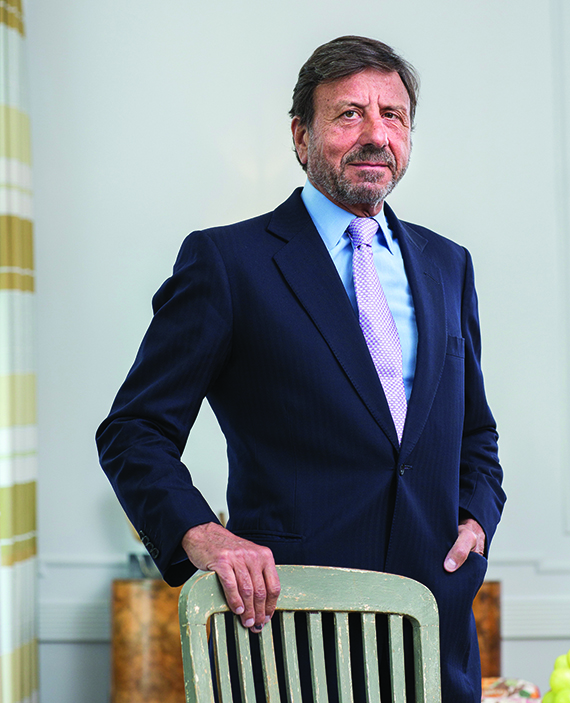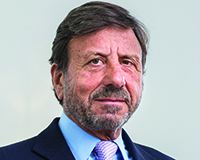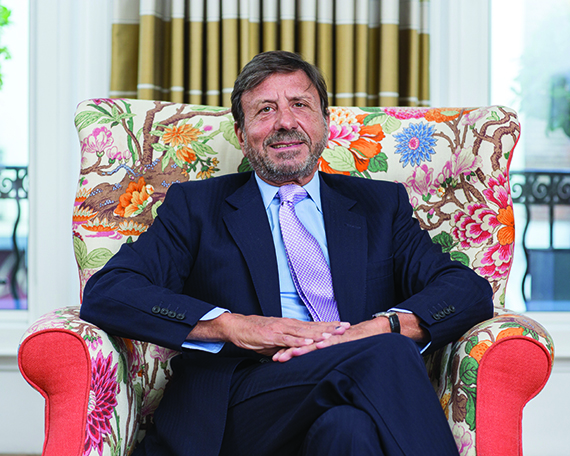
The door to the Kipling suite at Brown’s Hotel, Mayfair, swings quietly open. Into the £2,800-a-night expanse in the building where author Rudyard Kipling famously wrote The Jungle Book steps another famous name – at least in the context of the hotel/leisure world – Sir Rocco Forte.
Immaculate in his tailored suit, with a tanned complexion and looking younger than his 70 years, Forte is courteous, and keen to talk. The pre-interview PR brief wanted the focus of EG’s article to be on the future of Rocco Forte Hotels, and not of past battles that involved the hostile takeover from Granada, temporary loss of the Forte trademark, and surviving the latest recession.
With such a well-publicised history, however, it’s difficult not to ask Forte about the past.
Settling into the chair and ordering mineral water, Forte spots that his interviewer is Irish and so begins to recall tales of boyhood salmon-fishing on the west coast of Ireland – and then, in later years, of supping pints of Guinness with his father, Lord Charles Forte.
“I remember going to Dublin with my father and it was sort of a rush job. At the airport I said, ‘Look, I am not leaving until I have had a Guinness.’ He looked at me in absolute amazement – and he joined in.”
It was Forte’s father, born in the province of Frosinone, Italy, who started a milk bar business in 1935 on Regent Street and who founded what was to become the Forte Group. From those humble beginnings, the company grew into a vast conglomeration that included the Little Chef and Happy Eater roadside restaurants, the Crest, Forte Grand, Travelodge and Posthouse hotel chains, as well as the wine merchant Grierson-Blumenthal and a majority (although non-controlling) stake in the Savoy Hotel.
In 1992 Rocco Forte took over as the Forte Group’s chief executive – just before one of the most infamous period’s in the company’s history, when it lost its business to a hostile takeover by Granada (see panel).
After Granada-gate, Forte may have been down (although the family got a reported £350m from the deal) but he certainly wasn’t out, bouncing back in 1996 with the Rocco Forte Hotels. With this new venture, established with his sister, designer Olga Polizzi, Forte’s approach differed from the one his father had followed: he focused on one product.
“You can’t spread yourself thinly, so I decided to focus on the luxury [hotel]sector, where I thought there was a clear need and where I thought we could make an impact.” It is through Rocco Forte Hotels that the Forte eye is on the future. And that future is bright, both financially and growth-wise.
After a few tough years during the recession – in April 2012 its annual loss was £9.6m– Rocco Forte Hotels announced in March that it had more than halved its group debt, to £115m. As reported in EG, the group’s sale of non-core assets, including the Lowry in Manchester, and £60m of new equity from Italian state-backed sovereign fund FSI had enabled it to reduce its debt position and agree a new five-year facility with Bank of Scotland.
Forte’s existing debt with the bank had been due to expire in June. The new debt includes a development facility, which the group will use to aid its expansion plans.
“We have quite a focus on Italy. In cultural terms, there’s nothing quite like it in the world. It is a magnet for tourism – and particularly American tourism.”
Separately, Forte agreed financing with Unicredit and Banca Popolare di Milano on its 203-bedroom Verdura Golf & Spa resort in Sicily, extending the facility to 2024. As part of the deal, €15m (£11m) of debt was converted to equity and €10m to convertible bonds.
His mobile phone rings and an animated conversation in fluent Italian is quickly conducted. Given his Italian roots, Italy has always played a huge part in Forte’s life, and he is going to use some of that new debt to build up a chain of hotels there.
And Forte is unfazed by Italy’s ongoing economic woes as he has total faith in tourism dollars. “We have quite a focus on Italy. In cultural terms, there’s nothing quite like it in the world. It is a magnet for tourism – and particularly American tourism.
“So, despite the fact the European economy is stagnant, and the Italian economy is still in slight recession, that is not particularly relevant because the customers come from overseas.”
Forte already has three Italian hotels – in Rome (Hotel de Russie), Florence (Hotel Savoy) and Sicily (Verdura Resort). “Obviously I want to be in the major cities such as Milan and Venice where I am not represented,” he says. “I can easily do another hotel in Rome. Naples has started to pick up again, and then you can do smaller hotels in tourist towns with cultural attractions, which wouldn’t take a big hotel.”
There are also ambitions for Asia, the Middle East and the US, but none for the UK. “I don’t have any UK plans at the moment,” he says.
Forte, who owns the Balmoral in Edinburgh as well as Brown’s, does concede, however, that he would “do another hotel in London” if the opportunity arose. “I keep my eye
out, but nothing has come up yet that works.”
Globally, Forte has his sights set high. In June he signed for his first hotel in the Asia-Pacific market, in partnership with Longhua International. The yet-to-be-named 280-bedroom hotel will be the top 15 floors of the tallest building in the Longhua International Aviation Service Centre development in Shanghai. It is set to open in 2018.
Before that, the 146-bedroom Assila Hotel and Residence will open in April next year in Jeddah, Saudi Arabia.
Then there is the US. “I am looking hard at New York because about 30% of our business comes out of the US, so to have a calling card in New York is quite important for us. We also are looking in Miami… it’s a booming city and one that continues to grow really fast. It’s a gateway to South America. And eventually [we will look at] Los Angeles, but I don’t particularly want to be in every city across the US.”
Like Forte himself, who joined his father in business, his own daughters have become part of the family firm: Lydia is bar and restaurant development manager, and Irene is brand manager.
And Forte is determined the company will stay in family hands. When asked if he would ever sell or be taken over, he says: “No one can take me over unless I want them to take me over. So, that’s not an issue.”
Granada versus Forte
It was in the mid-1990s that the Forte Group faced a hostile takeover bid from Granada. Ultimately, Granada succeeded with a £3.87bn tender offer in January 1996. Along with the business went the use of the Forte trademark. However, in 2001, following the demerger of Compass Group from Granada’s media interests, the use of the Forte trademark was returned to Forte.
Forte, widely known for taking part in marathons and triathlons, had to face an equally tough endurance test during the takeover battle.“It was difficult,” he says. “Had I taken over from my father a bit earlier than I did, that could [have] changed things. But at the end of the day, I wouldn’t have really done much different. The only thing I might have done is more PR.”
noella.pio.kivlehan@estatesgazette.com












